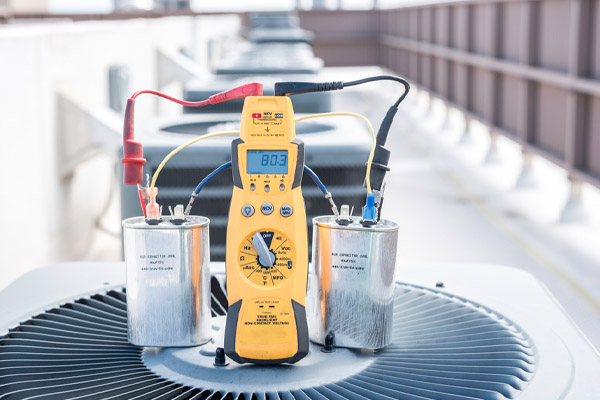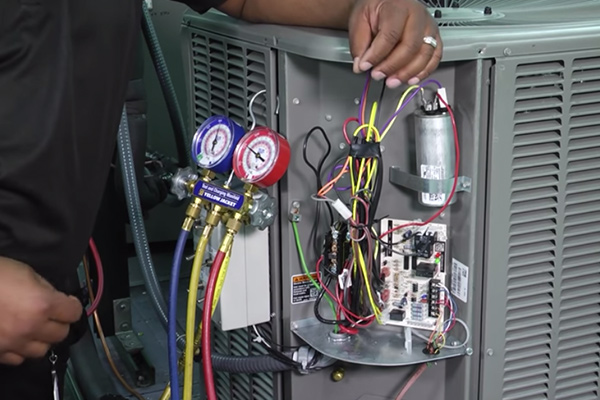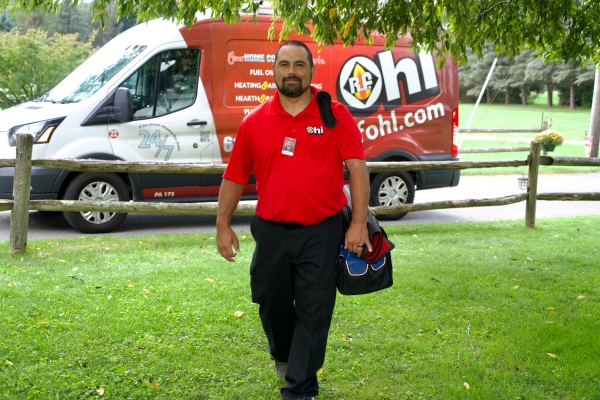Air Conditioner Capacitors: What They Are and Why They Matter

The functionality of your air conditioning system is heavily reliant on the small yet vital component known as the air conditioner capacitor. These compact electrical parts substantially influence the efficiency and performance of your air conditioning unit. For homeowners and those passionate about HVAC systems, grasping the role and significance of AC capacitors is crucial.
This article by R.F. Ohl delves into the intricacies of air conditioner capacitors, shedding light on their essential functions, the various types available, and the significance of recognizing capacitor issues for maintaining efficient cooling in your home. Understanding capacitors helps you identify and tackle potential problems, ensuring your AC’s optimal performance and longevity.
The Role of Air Conditioner Capacitors
Contents
An AC capacitor is ingeniously crafted, featuring two metallic conductors divided by a non-conductive material. Within air conditioning, these capacitors typically appear as sizable, cylindrical units, distinguished by two or three posts emerging from their top.
The AC capacitor is crucial in energizing the motors within your air conditioning system, ensuring your home is cooled efficiently. Despite its modest size, this essential element frequently requires replacement due to its propensity for malfunctioning or failure.
A malfunctioning AC capacitor can halt your HVAC system’s operation, causing inefficient cooling, added strain on the unit, and possibly higher energy costs. Recognizing its significance enables prompt issue resolution, maintaining efficient cooling, and avoiding extra expenses.
The Importance of an Air Conditioner Capacitor
The fundamental role of an AC capacitor lies in its ability to hold and dispatch electrical energy, which is essential for powering the motors that allow the AC unit to operate effectively. Upon activating the cooling system, the capacitor delivers an electrical burst, kick-starting the motors. This enables them to drive the compressor and fan, acting as a critical, albeit temporary, power source for initiating motor function.
The AC capacitor is crucial for motor startup; without it, motors may not start, leading to problems like the unit not turning on, weak airflow, or the compressor cycling on and off. In some cases, a failed capacitor can shut down the system. Thus, maintaining capacitor function is critical to the AC’s performance and efficiency. Regular maintenance and timely capacitor replacement can prevent breakdowns and ensure optimal cooling.
Don’t let a faulty AC capacitor disrupt your comfort – contact us for professional assistance. Call R.F. Ohl today!
Causes of AC Capacitor Failure

AC capacitors are prone to failure or malfunction for a range of reasons. Some of the common causes are:
- AC Capacitor Age and Wear: As capacitors age, they can deteriorate and lose their charging capacity. The internal components may weaken over time, diminishing their capacitance and leading to eventual failure.
- Overheating of the Capacitor: During normal operations, capacitors withstand heat, but when subjected to excessive temperatures, they overheat and deteriorate at an accelerated rate. Such high temperatures can cause the breakdown of a capacitor’s internal components and insulation, ultimately leading to failure.
- Air Conditioning Voltage Fluctuations: Capacitors can also fail due to the stress from rapid voltage fluctuations or power surges. Events such as electrical spikes, lightning strikes, or power outages can interrupt the normal operation of capacitors, resulting in malfunction or failure.
- AC Manufacturing Defects: Sometimes, the root of capacitor failure lies in manufacturing defects. These can range from using substandard materials and flawed assembly to insufficient testing procedures. Such defects render capacitors vulnerable to premature failure, impacting the system’s reliability.
- Excessive AC Electrical Load: Subjecting the air conditioning system to heavy electrical loads, whether by prolonged operation or use under extreme weather conditions, can significantly strain capacitors. This added pressure can expedite wear and tear, leading to their eventual failure.
- Environmental Factors: Capacitors can be adversely affected by harsh environmental conditions, like exposure to moisture, high humidity, dust, or corrosive chemicals. These elements can lead to corrosion, insulation breakdown, or even short circuits within the capacitor, significantly diminishing its performance and lifespan.
Regular air conditioner maintenance helps mitigate these risks. Routine inspections and testing can identify and address issues, preventing system failure. Signs of capacitor malfunction, such as bulging, leaking, or a burnt odor, indicate that a replacement is necessary to prevent further damage to the AC system.
Trust our HVAC professionals to handle all your cooling system concerns. Contact R.F. Ohl for reliable service you can count on. Call now!
Identifying a Faulty Air Conditioning Capacitor

When monitoring your air conditioning system for potential capacitor issues, be on the lookout for these key signs of a malfunctioning AC capacitor:
- Weak or No Cold Air: A clear sign of a problematic AC capacitor is when your air conditioner produces warm or weak airflow rather than cold air. Given the capacitor’s essential function in energizing the motors responsible for cooling, its failure can lead to inadequate cooling performance.
- Difficulty Starting: If your air conditioner experiences trouble starting, takes longer to kick in, or requires multiple attempts before successfully starting, it’s a strong indicator of a failing capacitor.
- Frequent AC Unit Cycling: When a capacitor is nearing the end of its life, it may cause your air conditioner to cycle on and off more often than it should. This erratic behavior stresses the system and accelerates wear and tear.
- Buzzing or Humming Sounds: If you hear unusual buzzing or humming noises from your air conditioner, it could indicate a capacitor issue. Faulty capacitors can create electrical disturbances, often audible as these strange sounds.
- Capacitor Bulging or Leaking: A visibly bulging or swollen capacitor that is leaking oil or showing signs of charring or burning is a clear indicator of a damaged or failing capacitor. These physical manifestations point to a compromised capacitor that requires immediate attention and likely replacement.
- Tripped Breaker: Excessive electrical currents from a failing capacitor can result in a tripped circuit breaker. Should your air conditioner frequently cause the breaker to trip, it’s advisable to consider the capacitor as a likely source of the problem.
Reasons DIY Fixes Are Not Suitable for AC Capacitor Problems
Seeking a professional HVAC technician’s expertise in AC capacitor issues is imperative for multiple reasons:
Safety Concerns
Handling electrical components, including capacitors, requires caution. Without proper knowledge and training, there’s a risk of electrical shocks or injuries, as capacitors can retain charge even when disconnected. HVAC professionals are specifically trained to safely handle electrical components and minimize risks.
Proper AC Problem Diagnosis

Faulty capacitors might cause air conditioning problems, but other issues could also be at play. HVAC technicians can accurately diagnose the root cause, identifying whether the capacitor or another problem is to blame.
Correct AC Capacitor Replacement
Capacitors vary in size, voltage, and capacitance, and choosing incorrectly can damage your AC or impair its function. HVAC professionals can select and install the suitable capacitor, avoiding further issues.
HVAC Warranty Considerations
Undertaking DIY repairs on an AC unit covered by warranty could invalidate that warranty. Certified HVAC technicians have the qualifications and knowledge to conduct repairs that preserve warranty terms.
Air Conditioner Efficiency and Performance
AC systems are intricate, relying on multiple components for optimal cooling. A professional can evaluate the entire system to ensure every component works well, enhancing efficiency, cooling effectiveness, and overall system performance.
Conclusion
Enlisting a professional HVAC technician to repair or replace your AC capacitor guarantees a safe, precise, and comprehensive approach to maintenance. This not only safeguards your investment and preserves warranty coverage but also secures your air conditioning system’s efficient and dependable performance.
Contact R.F. Ohl for All Your HVAC Requirements
R.F. Ohl provides top-tier heating and cooling services across Northeastern Pennsylvania, delivering comfort all year round. Our professionally certified technicians excel in HVAC tune-ups, repairs, installations, and replacements, ensuring your system operates flawlessly.
We pride ourselves on offering the area the most competitive costs for HVAC services. Our maintenance solutions are designed to enhance your comfort, boost your system’s energy efficiency, and minimize your heating and cooling expenses. Whether you need a repair or a new system, we offer tailored recommendations to fit your budget. Our satisfaction guarantee backs all work. Contact R.F. Ohl today to book an appointment and get a free in-home estimate.
For a free, in-home estimate and to schedule your service, call R.F. Ohl. Choose us for reliable and exceptional heating and cooling solutions that meet your expectations.
Click here to contact us today or give us a call at (610) 377-1098 if you have any questions. Click the link to view our service area.

Related Articles: